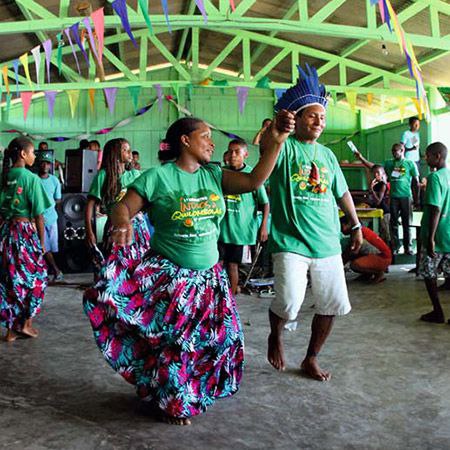
16/Jul/2021
The framework for the protection of traditional peoples has been disregarded by the country. Late submission of government responses to inquiries from the international organization and organizations prevents the manifestation of the Committee of Experts
Brazil has systematically violated Convention 169 of the International Labor Organization (ILO), as social organizations denounced in a recent report. The report presented before ILO by the National Coordination of Rural Black Quilombola Communities (Conaq), and by the Coordination of Indigenous Peoples of Brazil (Apib), with the support from the Land of Rights and Central Única dos Trabalhadores (CUT), list a set of actions perpetrated by the Brazilian State that violate the main international legal instrument on the protection of the rights of indigenous peoples, quilombolas and other traditional peoples and communities.
The report emphasizes that the State’s failure to protect indigenous peoples, quilombolas and other traditional peoples in the face of Covid-19 particularly violates the rights of these traditional peoples, exposing them to a context of even worse vulnerability under the pandemic and its effects.
Similar complaints are part of actions filed by Apib and Conaq, in association with other institutions, before the Brazilian Supreme Court (STF). In judgments of both actions, the Ministers recognized the government’s omission and determined that the Brazilian State had to develop and implement urgent plans to fight the pandemic addressed to indigenous peoples and the quilombola population, as well as the inclusion of these groups as priorities for vaccination in the National Immunization Program. Several months after the decisions by the STF, Conaq, Apib and other organizations have repeatedly denounced the weaknesses in the implementation of these measures.
Fundamental in guaranteeing the rights of traditional peoples, quilombolas and indigenous peoples in Brazil, Convention 169 has guided parameters for several Brazilian norms and public policies since the ratification of the norm by the country, in 2002. Even after more than 15 years of validity in national territory, before the pandemic, Brazil was already violating the Convention, point out the organizations. The urgency of the denunciation at this moment, however, underline the organizations, is that the violations have been intensified in the last three years and the rights already assured have suffered significant retractions, especially during the Bolsonaro government.
As the legal advisor of Terra Direitos, Maira Moreira, highlights, “one of the most fundamental instruments for asserting the rights of indigenous peoples, quilombolas and other traditional peoples and communities is being successively and repeatedly violated by the Brazilian State, producing a situation of genocide of these peoples and communities, a slow and gradual genocide, in which all their material, cultural and social conditions are undermined, putting the existence of these peoples and communities under risk”. Since “[the Convention] was already being violated, but in the context of the pandemic, this violation was aggravated”, reiterates Apib’s lawyer, Eloy Terena.
No centimeter
The period of the recorded violations against the 169 Convention by the Brazilian State coincides with Jair Bolsonaro’s term as president. . Openly opposed to the rights of traditional peoples and communities, the president has already stated that in his government “there will not be a centimeter demarcated for an indigenous or for a quilombola land”.
It is not only the presidential declarations that go shoulder to shoulder with the denial and violation of the rights of these populations, but also the dismantling of the indigenous and quilombola policies established by the national government.
In the list of attacks against traditional territories, they are still the incursions by land grabbers, miners and ruralists. In 2020, among the 81,225 families who were victims of invasions in their territories, 58,327 were indigenous, according to a survey released by the Pastoral Land Commission (CPT). “The territories were completely at the mercy of these invaders. Their presence alone is a violation of the exclusive use of indigenous peoples over their territories, but in this pandemic, illegal incursions become a vector for the spread of the disease”, emphasizes Eloy.
The document sent by the organizations to the ILO also highlights the violation of the right to self-determination by the people, attacks on policies for these people, such as the extinction of the Secretariat for Continuing Education, Literacy, Diversity and Inclusion (Secadi), among other violations.
Legislative threats
The most expressive caucus in Congress, congressmen linked to the Parliamentary Front for Agriculture – a lobby supported by agribusiness associations and companies – account for 32 of the 81 seats in the Senate. In the Chamber, the 225 deputies affiliated to the front will represent 44% of the total votes (513) of the entire legislative house.
With this majority representation and no correspondence with the composition of the Brazilian population, the ruralists impose an agenda that enables the market to enter the territories. A singular example is PL 490/2007. The bill threatens the demarcation of indigenous lands, opens the doors of these territories to agricultural projects, hydroelectric plants, mining, roads and mining. In a scenario of intense police violence against indigenous people around the Chamber of Deputies and lack of dialogue with those who will be impacted by the measure, the PL was approved by the Chamber’s Constitution and Justice Commission (CCJ) on June 23rd.
The Draft Legislative Decree (PDL) No. 177/2021, on the other hand, seeks to directly violate Convention 169. Authored by federal deputy and member of the FPA, Alceu Moreira (MDB-RS), the bill filed in April this year aims to authorize the president to denounce ILO Convention 169, that is, if approved, the Legislative Decree would allow Bolsonaro to withdraw Brazil from the Convention, a procedure called “denouncement”, representing a huge setback to conquered rights. The legislative matter has already been distributed to the House commissions.
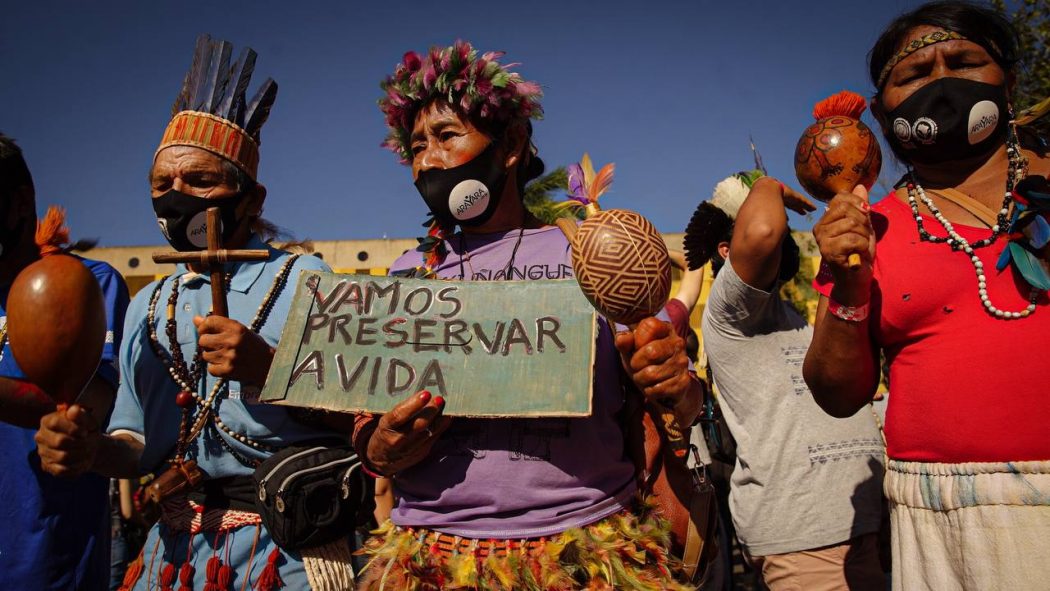
16/Jul/2021
The appeal was made in the same week Brazil was mentioned due risk of atrocity against indigenous peoples; Brazilian government tried to present a counter-argument, denied by the UN organism
By Adi Spezia and Tiago Miotto, Cimi’s Communication Department
In a joint statement during the 14th Session of the UN Mechanism of Experts on the Rights of Indigenous Peoples (EMRIP), the Articulation of Indigenous People from Brazil (Apib) and the Indigenous Missionary Council (Cimi) denounced this Wednesday (14) measures adopted by the Brazilian government and by the National Congress that attack the rights of indigenous peoples in Brazil, such as 490 Bill, which in practice makes unfeasible new demarcations of indigenous lands, and the thesis of the temporal framework.
The meeting, which aims to listen to indigenous peoples and their organizations, was held virtually in this edition, due to the pandemic. It had as its central issue the self-determination of peoples and the rights of indigenous children. The EMRIP is a unique mechanism whose members are exclusively indigenous peoples. “It is a very important mechanism for the world’s indigenous community, led by indigenous peoples,” explains Paulo Lugon Arantes, Cimi’s international advisor.
Arantes, speaking on behalf of both organizations, highlighted the seriousness of the temporal frame and of the more than 30 other bills pending in the Brazilian Congress that violate the right of free determination from native peoples. The 490 Bill, recently approved by the Commission for the Constitution and Justice (CCJ) from the Chamber of Deputies, was highlighted as one of the main threats to indigenous rights today.
“The time frame is disastrous because it will leave an incalculable mark of exclusion and marginalization over peoples who have not yet had their territories demarcated or who have been expelled from their traditional territories”, said Paulo.
The organizations also denounced the Brazilian government’s anti-indigenous agenda, which led the UN Special Advisor for the Prevention of Genocide, Wairimu Nderitu, to express an unprecedented concern with the situation of indigenous peoples in Brazil.
“President Bolsonaro has a clearly anti-indigenous agenda, which led the UN advisor for the prevention of genocide to include Brazil in the World Atrocity Map”, said the advisor, on behalf of Apib and Cimi.
Reply denied
After the joint statement, the representative from Brazilian government asked for “the right to reply”, due to the fact that the country was mentioned. The response was denied by the EMRIP secretariat, who replied that Governments have no right to respond before the mechanism. “The members of the EMRIP are the only members of the mechanism and all others are observers,” explained the secretary.
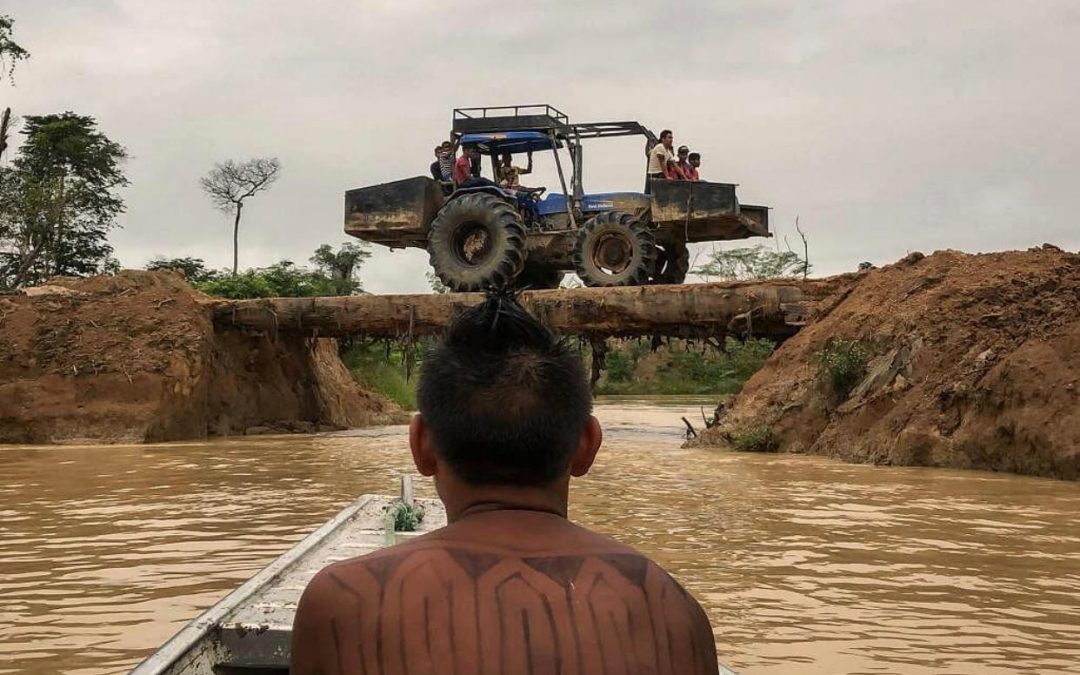
26/May/2021
The Association of Brazil’s Indigenous Peoples (@apiboficial) and the Coordination of Indigenous Organizations in the Brazilian Amazon (@coiabamazonia) denounce a serious offensive underway this Wednesday (26th) against Indigenous leaders of the Munduruku Indigenous Territory. Illegal gold miners operating in the region are attacking with gunshots and burning houses in retaliation for a Federal Police operation in the region.
The presence of the National Forces in the region since Monday (24) does not inhibit the miners, who continue to commit acts of violence to threaten and intimidate leaders who are against illegal mining in indigenous territories Armed men, who displayed gallons of gas, invaded an indigenous village of the Munduruku people and set fire on Maria Leusa Munduruku house, coordinator of the Wakoborum Munduruku Women’s Association – the organization that has been attacked by miners on March.
There are suspicions that the attack was organized after the leak, on Tuesday (25), of a document by the Federal Police Crime Repression Service against Indigenous Communities for land grabbers who act in seven national forests and Indigenous territories in the Pará state.
Once again, Indigenous lives are threatened by mining and illegal miners in the Amazon. The terror routine is also repeated at Yanomami Territory, in Roraima, under intense attack since the beginning of May. Brazilian congresswoman Joenia Wapichana denounced the situation at the Munduruku Territory during a session of the Federal Chamber’s Human Rights and Minorities Commission.
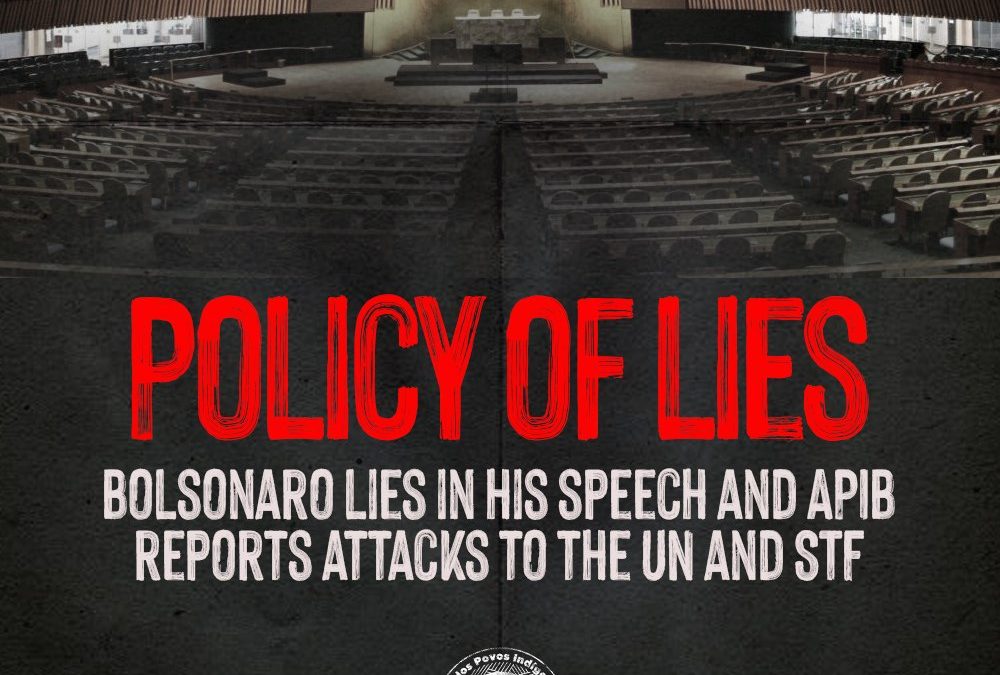
24/Sep/2020
By blaming Indigenous Peoples and traditional communities again for the Amazon fire, Jair Bolsonaro consolidates lying as a political move during the General Assembly of the UN. Also, on Tuesday (22nd September) APIB filed a complaint with the Federal Supreme Court (STF) requesting the government to explain in court the lies it spreads and informed the UN about the attacks on Indigenous Peoples.
In his speech as Head of State at the 75th edition of the General Assembly of the United Nations, Jair Bolsonaro distorts reality to sell the image of a Brazil that does not exist. Thus, relieving his administration of any responsibility for actions to combat the pandemic and protect the environment. Bolsonaro’s main tool is lying.
Bolsonaro’s allegations aim to give credit to his administration for actions that were not theirs. For example, the initial amount proposed by the federal government for Auxílio Emergencial (Emergency Aid), one of the main economic policies created during the pandemic, was only R$200.00. But social mobilization with the National Congress ensured an increase to R$ 600.00. The Emergency Aid was also extended to a total of 9 installments (5 installments of R$600 and 4 t of R$300), which altogether amounts R$4,200, equivalent to about US$771,49. Thus, in his speech, Bolsonaro lied both about the government’s position in approving the Emergency Aid and the amount – which he claimed was about US$1,000 dollars.
In regard to the environment, since the beginning of his administration Bolsonaro has made 127 false or distorted announcements (data from the fact checking agency Aos Fatos). And, once more, the president chose to lie and attack.
He lied when he related the Amazon’s and the Pantanal’s fires to the fact that our forests are humid and blamed Indigenous Peoples for the fire outbreaks, shifting responsibility for criminal deforestation caused by landowners. Data from NASA monitoring system shows that 54% of Amazon’s fire outbreaks are related to deforestation. In Pantanal, the Brazilian Federal Police is investigating farms that were criminally burned in order to open pastures for livestock.
Misinformation as a strategy
Bolsonaro also claims that his administration is suffering disinformation campaigns.
It is increasingly evident that the president’s criterion for defining disinformation is based on what is convenient for his government. Criticism, data, formal questioning are part of the democratic rule of law. However, Bolsonaro’s administration has used official structures to promote and encourage attacks on any people, organization or media outlets that point out flaws or demand responsibility from his government.
For example, last Friday (18th September), General Augusto Heleno, State Minister Head of the Institutional Security Office, published declarations on social media criminalizing the Coalition of Indigenous Peoples of Brazil (APIB) and its leadership, and directly attacking Sonia Guajajara, APIB’s executive-coordinator, whose trajectory in defense of Indigenous and socio-environmental rights is internationally recognized. The Minister alleged that APIB has committed a crime against the State for denouncing the flagrant environmental crimes for which President Jair Bolsonaro must be held responsible.
Fearing for the safety of our leaderships, APIB filed today (22nd September) a complaint with the Federal Supreme Court (STF) requesting Minister Heleno to explain in court the lies and attacks he made to APIB and Sonia Guajajara.
“The Government and its representatives cannot place targets on the backs of leaders, activists or people who cause them inconvenience due to their political position, under penalty of, then, committing crimes that must be punished ”, emphasizes one of the excerpts from document that can be accessed in full here.
Today (22nd September) we have also sent a statement to the UN about Bolsonaro’s government attack on APIB, highlighting that Minister Heleno and Bolsonaro’s administration have made several intimidating accusations against our actions in defense of Indigenous Peoples
and that this is an indecorous attempt at criminalization, a completely inadequate posture for a Minister of State that underlines its anti-democratic character when it pursues those who fight for the environmental protection of ecosystems and the Indigenous peoples of Brazil.
The attack by Minister General Heleno, in addition to showing total ignorance about the history and construction of the APIB, confirms the use of disinformation as a political strategy by the Bolsonaro government, since it directs frivolous accusations on social media that encourage, above all, the criminalization of organized Indigenous movements. “The biggest crime that harms our country is the government’s failure to destroy our biomes, protected areas, illegal fires, land grabbing, deforestation and invasion of our lands and the theft of our wealth”, highlights an excerpt from APIB’s note published in response to the minister’s lying accusations.
It is important to note that, while the government abuses its power and uses smear campaigns to pursue an organization that acts to reduce the impact of Covid-19 on native peoples, more than 800 Indigenous persons have died so far, and about 32 thousand have been infected by the new coronavirus, according to data from the National Committee for Life and Indigenous Memory of APIB.
The Federal Government had to be judicially forced by the STF to present a specific combat plan to be applied in context of Indigenous peoples, contradicting Bolsonaro’s claim at the UN that he provided due assistance to them. On the other hand, when Congress Members presented a bill that provided an emergency plan to contain the damage of the pandemic, Bolsonaro vetoed parts of the bill such as the guarantee of access to drinking water, ease of access to emergency aid, among other fundamental rights.
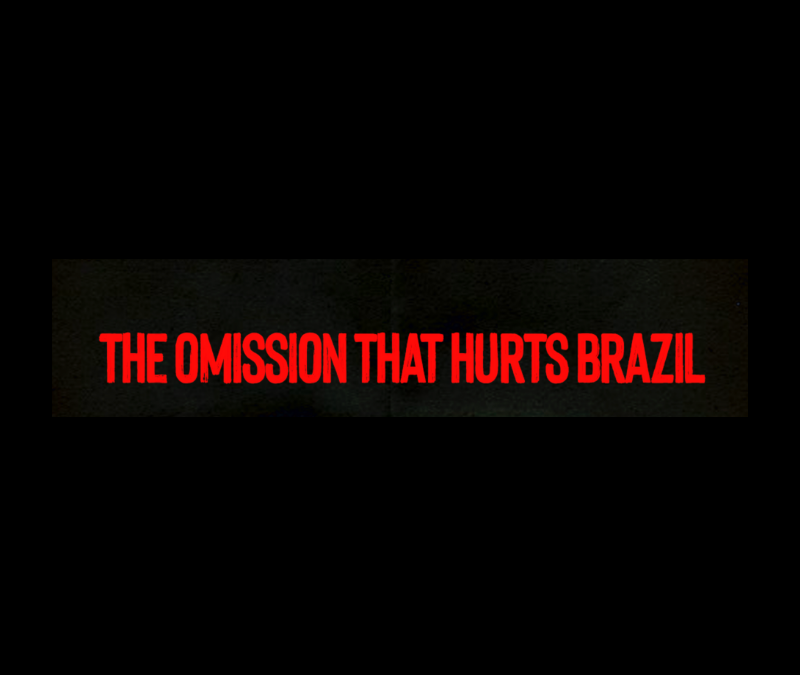
18/Sep/2020
While the Brazilian Federal Government is passively watching the devastation of our biomes by criminal fires, the Head of the Institutional Security Office, General Heleno, has published a serious accusation on his social networks. The General claims that the Articulation of the Indigenous Peoples of Brazil (APIB) and the indigenous leadership, Sonia Guajajara, committed a crime against the country.
APIB rejects the declaration. We understand that the biggest crime against our country is the omission displayed by this government in face of the destruction of our biomes, of our protected areas, of the illegal fires and land grabbing, of the deforestation and of the invasion of our lands and the theft of our wealth.
On the eve of the United Nations General Assembly, the whole world is witnessing these crimes, which are too big to be concealed. Instead of attacking individuals who work to protect the environment and guarantee the rights of Brazilian indigenous peoples, the authorities should use this moment to fulfill their constitutional oaths and present the nation with a plan to fight the fires that afflict the country and, in doing so, protect the economy and Brazil’s international reputation.
The accusations, in addition to being frivolous and false, are irresponsible, as they endanger the personal security of those mentioned.
APIB is evaluating appropriate response measures.
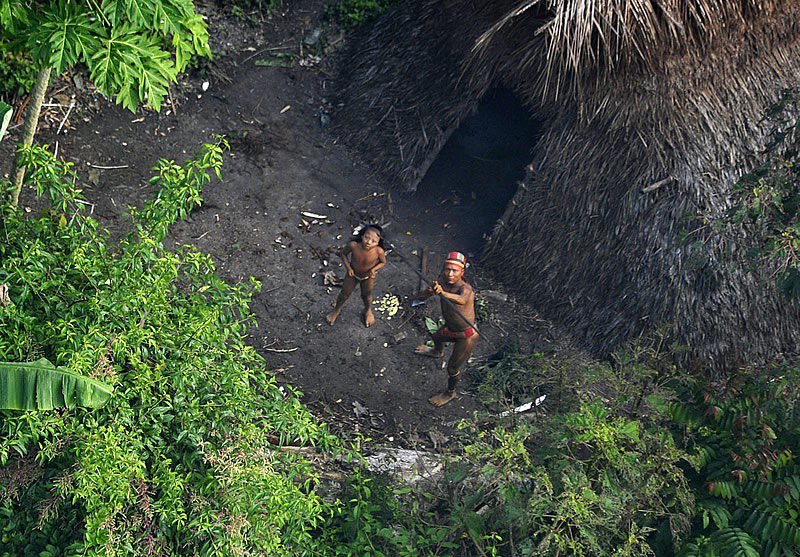
01/Feb/2020
APIB – Coalition of the Indigenous Peoples of Brazil (APIB) , along with several indigenous, indigenists and human rights organizations of Brazil, vehemently rejects the notification that the Chairmanship of Funai (National Indinegous Foundation) intends to designate an evangelical pastor connected to proselytizing activities of the New Tribes Mission of Brasil (MNTB), a North American missionary organization, to take Funai’s General Coordination for Isolated and Recent Contact peoples. The harmful effects of proselytizing activities on isolated indigenous peoples in Brazilian territory are known throughout history. There are countless occasions in which the coercive contact by missionary groups, including those connected to MNTB, resulted in a high number of deaths from illnesses, socio-cultural disruption and deterritorialization.
FUNAI, headed by a Federal Police chief appointed by members of the Ruralist lobby, is once more undermining the indigenous peoples rights, as well as dismantling the federal indigenous agency and the policy of non-contact with isolated indigenous peoples that began in 1987, and has international recognition. Instead of searching for competent technical staff within the Foundation, those with experience on working with isolated peoples, with technical capacity and aligned with the constitutional principals of honouring the autonomy of indigenous peoples, FUNAI yields to evangelical and proselytizing interests, undermining the secular policy of respect for indigenous peoples, that goes against what the 1988 Constitution determines.
We denounce, once again, the rapid dismantling of the public policies for indigenous peoples done by the Bolsonaro government, through the indigenous policies subjugation to the interests of religious groups that support their government and, in many cases, to the ruralist group that eagers the lands traditionally occupied by these peoples. It is another situation prone to violate the human rights intentionally triggered by the current government, and that could lead to the physical, sociocultural and spiritual death of isolated and recently contacted indigenous peoples living in Brazil. Indigenous peoples in Brazil and their representative organizations will continue fighting against the anti-indigenous measures of the Bolsonaro government and enduring for the sake of a republican and secular indigenous policy, which abides the indigenous rights, secured by the 1988 Constitution.
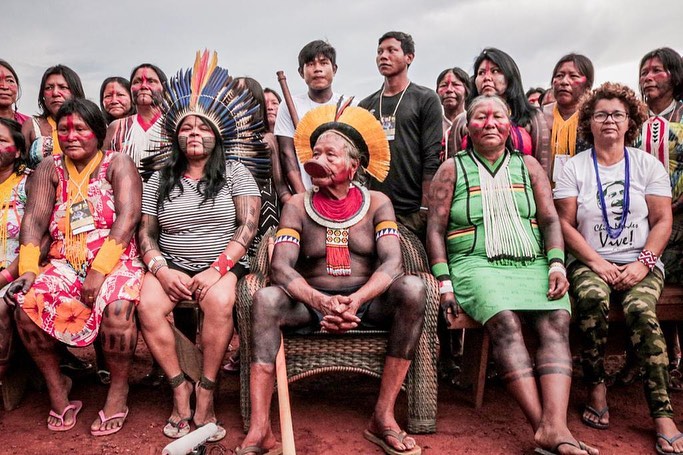
20/Jan/2020
We, representatives of 45 indigenous peoples in Brazil, more than 600 participants, were summoned by chief Raoni to meet between January 14 and 18, 2020 in the village Piaraçu (Terra Indígena Capoto Jarina), with the objective of bringing together our forces and denounce that a political project of the Brazilian government of genocide, ethnocide and ecocide is underway.
The Brazilian State has to understand that it has a historic debt to indigenous peoples. We are the first inhabitants of our country. We not only defend the environment: we are Nature itself. If they kill the environment, they are killing us. We want the forest forever standing, not because the forest is beautiful, but because all these beings that inhabit the forest are part of us and run in our blood.
The Brazilian State recognizes indigenous rights by the Federal Constitution of 1988 in Articles 231 and 232, in which’s creation we were involved, in addition to other national and international legal standards, such as the 169 convention of OIT. So we demand, that whenever projects and decisions that may impact and threaten our territories and ways of life are projected, our right to free, prior and informed consultation be respected.
We don’t need to destroy to produce. They cannot sell our wealth; money does not pay for it. Our territory is very rich, not in money, we are rich in diversity and this whole forest depends on our culture to stand. What counts for us is our land. This is worth more than life. And we are the ones who can sustain nature are, us who never destroyed or polluted our river. We take care of our land; we know it’s value. We must protect that which our ancestors left us.
The current government’s threats and hate speech are promoting violence against indigenous peoples and the murder of our leaders. Today we must prepare ourselves to face not only the government, but also to react to the violence of some sectors of society, who very clearly express racism just because we are indigenous.
The indigenous women present at the gathering, leaders and warriors, generators and protectors of life, reaffirm their fight against the abuses that their bodies, spirits and territories are facing. It is women who guarantee our ways of life and our language. They guarantee our existence in our collective home. We indigenous women and men fight side by side for the right to the land that feeds and heals us.
The indigenous youth present at this gathering reaffirms the commitment to continue the struggle of the leaders in defense of our lives, our territories and our right to exist. The knowledge and traditions that our grandparents taught us are the great solution to the threats against our people and our territories, and to the climate crisis that is coming. This new generation is ready to take the solutions they have been taught.
Only we can talk about ourselves and for ourselves. We do not admit chiefs being disrespected, just as Bolsonaro did in 2019 in his speech during the UN meeting against chief Raoni. We affirm that Chief Raoni is YES our leader and he represents us! He will be our reference, for his firm and peaceful struggle, for his leadership: today and always. That is why we support his candidacy as a Nobel Peace Prize. We demand that Congress legally recognize indigenous authorities as the first rulers of this country. Our lands are governed by our chiefs, indigenous authorities who decide in favor of communities, based on collective claims and not individuals.
The current president of the republic is threatening our rights, our health, our territory. The current government has a plan to permit extraction of ore, and livestock, in our territories. We join our forces, reunited together and show our strength in this document to continue our struggles that are being followed by our grandchildren. The current government is attacking us, wanting to take the land out of our hands. We do not accept gold digging, mining, agribusiness and leasing on our lands, we do not accept loggers, illegal fishermen, hydroelectric plants and other projects, such as Ferrogrão, that will impact us in a direct and irreversible way.
We are against everything that destroys our forests and our rivers. We don’t admit that Brasil be put on sale for other countries who have the intention of exploiting our territory. We want above everything respect for our lives, our traditions, our costums and the Federal Constitution which protects our rights.
We write this document as a clamor, so that we indigenous peoples can be listened to by the three powers of the republic, by society and by the international community.
Consultation processes must guarantee our right to say NO to government and Congress initiatives. Consultations must respect our traditional forms of political representation and organization, as well as our autonomous protocols for consultation and consent.
We make clear that the indigenous people that now hold positions in the federal government, without our participation in their appointment, and who support in some manner Bolsonaro’s government, do not represent us
We demand the compliance of our original right over our territories through the demarcation and homologation of the claimed indigenous lands. We repudiate the thesis of the timeframe and demand that stopped demarcation processes be resumed immediately, as Kapot Nhinore, the former claim of chief Raoni.
We are against the municipalization of indigenous health and against the political nomination for positions at SESAI. We demand the political, administrative and financial autonomy of the Special Indigenous Health Sanitary Districts – DSEI’s and the strengthening of social control through the recreation of the District Indigenous Health Councils Presidents Forum – CONDISI, extinguished by Decree 9.759 / 2019. We demand the guarantee of a qualified and adequate workforce for our service.
We demand compliance with the Conduct Adjustment Term – TAC signed between the Ministry of Health, FUNAI, SESAI, the Federal Public Defender’s Office and the Federal Public Ministry, which guarantees the continuity of services related to indigenous health policy. And we demand the holding of the 6th National Conference on Indigenous Health.
We demand compliance with the indigenous policy under the responsibility of FUNAI and SESAI for all indigenous peoples and indigenous territories in Brazil, and not only for the approved indigenous territories.
We reject the persecution and attempt to criminalize our leaders, indigenous and indigenous organizations, collaborators and partners.
We demand guarantee of the physical and moral integrity of our communities and leaders and the punishment of those who are killing our relatives.
We demand that the Brazilian State fulfill its constitutional responsibility to protect indigenous territories and the environment, restraining illegal activities and punishing criminals. We also demand that the government take responsibility for the poisoning of the air, soil and rivers caused by the irresponsible and uncontrolled use of pesticides around our lands.
We demand compliance with public policies for the protection of isolated and recently contacted peoples.
We demand a differentiated and quality education for our young people, which allows them to complete their training, from basic education to high school, in our territories. We do not accept the scrapping of public universities and we ask for the guarantee of continuity of scholarships for indigenous youths who are going to study in the city at universities. The university education of young people is important for the continuity of our struggle. It is a space that ensures that we are prepared for the changes that threaten us. For this reason, the youth holds the pen in their hands next to what has been taught by their grandparents to launch the arrow that was given to them, to continue fighting. Being at university only makes sense if we exercise our spirituality. In this sense, we ask Brazilian society to join us in the struggle for access to plural and democratic universities, for university education that values and recognizes the science of the territory.
We want policies to strengthen sustainable economic alternatives for our territories, without the use of pesticides, and that promote the economy of the Standing Forest, with an emphasis on culture, traditional knowledge, no extractivisim and clean technologies.
We are human beings, we are the originary people from Brazil. We are part of Brazil and Brazil is part of us. We do not accept them saying that our territories are too big, because that does not compare to the size and strength of our culture and to what we have contributed to maintain, not only our lives and ways of life, but the lives of everyone on the planet. Brazil was not born first, it was us indigenous peoples, and we were massacred, but we continue to resist in order to exist.
We are not alone. At this great meeting, we declare the resumption of the Forest People’s Alliance, which includes the Caatinga, Pantanal, Cerrado, Atlantic Forest and the Amazon. We will be together defending the protection of our territories. This struggle is not only for indigenous peoples, but for all of us, it is a struggle for the life of the planet.
We conclude certain that 2020 will be a year of a lot of struggle, and we call on all relatives and partners of Indigenous Peoples, in Brazil and abroad, for a year of many mobilizations, where we must be present with the strength and energy of our ancestors in Brasilia and on the streets around the world. The fight will continue until the last Indigenous person is standing!
Piaraçu Village, January 18, 2020
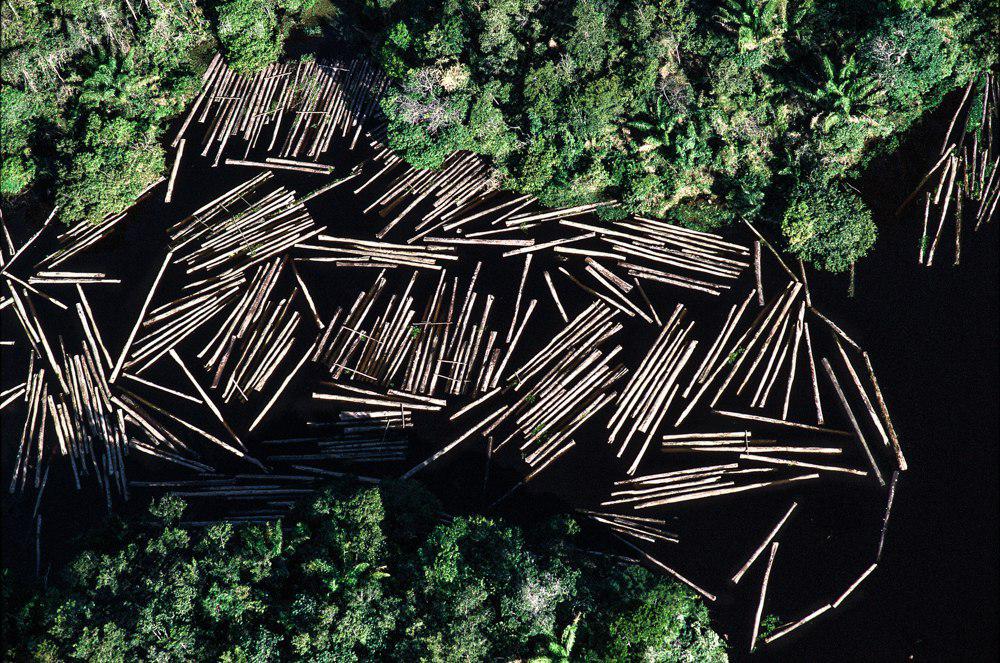
26/Aug/2019
on occasion of the G-7 Summit in Biarritz, France (August 2019)
The dramatic increase in the number of fires in the Brazilian Amazon during 2019, with 32,748 ocurrences registered between January 1st and August 14th (60% above the average of the previous three years) following an alarming increase in the rate of deforestation over the past year, has provoked outrage and protests in Brazil and around the world, to the point where this issue has been urgently included in the agenda of the G-7 summit to be held in Biarritz, France.
Problems of deforestation and burning in the Amazon have a long history; however, the worsening of this situation in 2019 is a direct result of the behavior of the government of President Jair Bolsonaro. Factors intensifying the environmental crisis in the Amazon, associated with the federal government, include:
- The refusal to demarcate indigenous lands, along with attempts to open up territories for exploitation by mining, hydroelectric dams and agribusiness interests, disrespecting the Federal Constitution;
The deliberate and systematic dismantling of the operational capacity of IBAMA, the federal environmental agency, and other institutions responsible for enforcement against illegal acts of public land grabbing, forest clearing and burning, logging and mining;
- Public statements by President Bolsonaro concerning his commitment to loosening enforcement and suspending fines for illegal activities, sending a clear signal of impunity that encourages environmental crimes;
- Budget cuts, persecution of employees and dismantling of the structure of ICMBio, the federal agency responsible for the management of protected areas;
Backsliding in the legal framework for environmental licensing of infraestructure, mining and agribusiness projects, characterized by high social and environmental impacts and risks;
- Abandonment of the Action Plan for Prevention and Control of Deforestation in the Amazon (PPCDAm) launched in 2004 and largely responsible for a major decrease in deforestation rates between 2005 and 2012;
- Manipulation of agencies responsible for environmental protection, through nomination to high-level government posts of individuals linked to the immediate interests of agribusiness and other sectors that should be subjected to public regulation;
- Attempts to discredit technical institutions of the federal government responsible for monitoring deforestation and other environmental problems, as in the case of the National Space Research Institute (INPE).
The increase in deforestation and burning in the Amazon, associated with land grabbing and illegal exploitation of timber and other natural resources, is directly connected to rising acts of violence against indigenous peoples, traditional communities and social movements; violence that has remained in impunity, in the great majority of cases. Meanwhile, President Bolsonaro has encouraged the criminalization of social movements and NGOs, reaching the absurdity of blaming them for increased burning in the Amazon.
Such actions, omissions and discourse have made Brazil a global outcast in an area where the country was previously a protagonist. This threatens the Amazon, the largest heritage of Brazilians, the well being of the population and the global climate, which cannot withstand emissions from the destruction of the Amazon. Ironically, this situation now threatens the future of the Brazilian agribusiness sector that the president claims to defend.
The Brazilian government urgently needs to take responsibility for leading a series of efforts, involving public, private and civil society actors, to address this grave problem, including among other concrete actions:
August 26, 2019
Co-signing organizations:
Articulação dos Povos Indígenas do Brasil – APIB Associação Terra Indígena do Xingu – ATIX Associação Floresta Protegida
Associação Alternativa Terrazul
Associação das Comunidades Montanha e Mangabal Associação Indígena Aldeia Maracanã- AIAM Associação de Pesquisa Xaraiés MT
Articulação pela Convivência com a Amazônia – ARCA Articulação Internacional de Atingido(a)s pela Vale Amazon Watch
Coordenação das Organizações Indígenas da Amazônia Brasileira – COIAB
Coordenação Nacional de Articulação das Comunidades Negras Rurais Quilombolas – CONAQ
Cáritas Brasileira Regional Minas Gerais
Centro de Formação do Negro e Negra da Transamazônica e Xingu
Clínica de Direitos Humanos – Universidade Federal de Minas Gerais
Coletivo de Mulheres do Xingu
Comitê Nacional em Defesa dos Territórios Frente a Mineração
Coletivo Mura de Porto Velho
Comitê em Defesa da Vida Amazônia na Bacia do Rio
Articulation of Brazilian Indigenous Peoples – APIB Association of the Xingu Indigenous Territory – ATIX Protected Forest Association
Alternative Association Blue Planet
Association of Communities Montanha & Mangabal Maracanã Village Indigenous Association – AIAM Xaraiés Research Association – MT
Articulation for Coexistence with the Amazon – ARCA International Articulation of People Affected by Vale Amazon Watch
Coordination of Indigenous Organizations of the Brazilian Amazon – COIAB
National Coordination of Rural Afro Brazilian Quilombola Communities – CONAQ
Caritas Brazilian Regional Minas Gerais
AfroBrazilians Training Center of the Transamazon and Xingu
Human Rights Clinic, Federal University of Minas Gerais
Xingu Women’s Collective
National Committee in Defense of Territories Against Mining
Mura Collective of Porto Velho (Rondônia) Committee in Defense of Amazonian Life in the
Madeira
Conectas Direitos Humanos
Conselho Indigenista Missionário – CIMI Fórum Mudanças Climáticas e Justiça Social Fórum da Amazônia Oriental – FAOR
Fórum em Defesa de Altamira Fórum Bem Viver
Fundação Darcy Ribeiro GT Infraestrutura Greenpeace Brasil Instituto Raoni Instituto Makarapy Instituto Kabu
Instituto Socioambiental – ISA Instituto Madeira Vivo – IMV Instituto Fronteiras International Rivers – Brasil
Movimento dos Trabalhadores Rurais Sem Terra – MST Movimento de Mulheres Campesinas – MMC Movimento pela Soberania Popular na Mineração-MAM Movimento Fechos Eu Cuido
Movimento Tapajós Vivo Movimento Xingu Vivo para Sempre Mutirão Pela Cidadania
Operação Amazônia Nativa – OPAN Pacto das Águas
Planète Amazone Proteja Amazônia
Rede de ONGs da Mata Atlântica – RMA Rede GTA
Rede Brasileira de Arteducadores – ABRA Rios de Encontro – Marabá
Sindiquímica – PR Uma Gota no Oceano WWF-Brasil
Madeira River Basin Conectas Human Rights
Indigenist Missionary Council – CIMI
Forum on Climate Change and Social Justice Forum of Eastern Amazônia – FAOR
Forum in Defense of Altamira Forum for Well-Being
Darcy Ribeiro Foundation Infrastructure Working Group Greenpeace Brasil
Raoni Institute Marakapy Institute Kabu Institute
Socioenvironmental Institute – ISA Madeira Alive Institute
Frontiers Institute International Rivers – Brazil
Movement of Landless Rural Workers – MST Movement of Peasant Women – MMC
Movement for Popular Sovereignty in Mining-MAM Movement Caring for Fechos
Tapajós Alive Movement
Xingu Forever Alive Movement Coalition for Citizenship
Operation Native Amazonia – OPAN Pact for Waters
Amazon Planet Amazon Protection
NGO Network for the Atlantic Rainforest – RMA GTA Network (Amazon Working Group) Brazilian Network on Art-Educators – ABRA Rivers of Encounters – Marabá
Sindiquimica – PR
A Drop in the Ocean WWF-Brazil
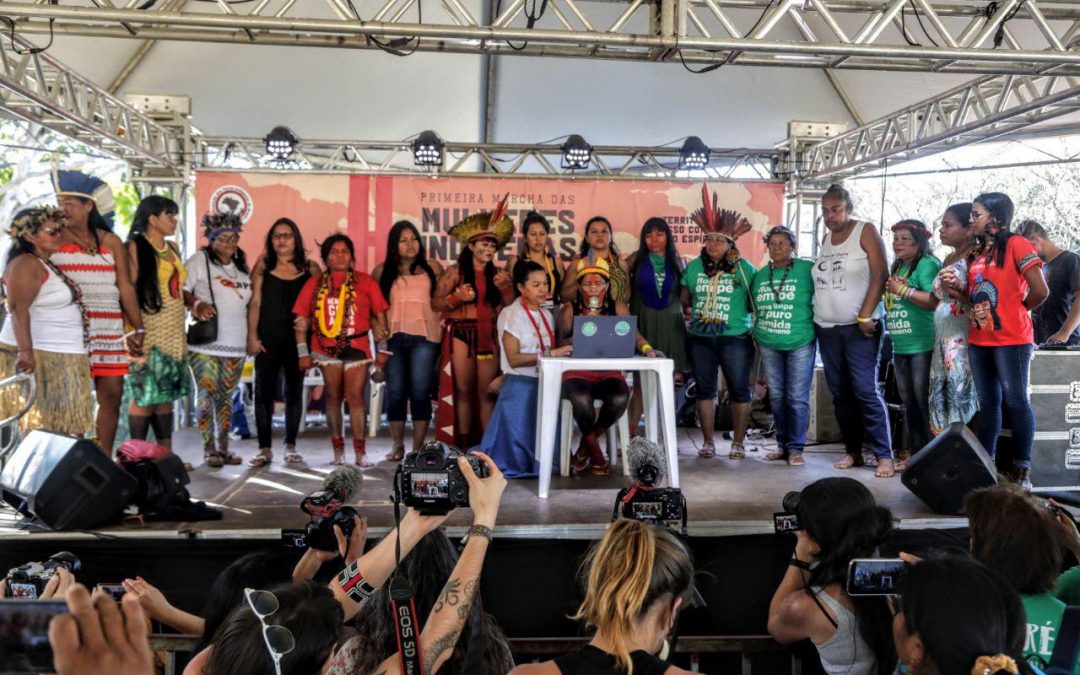
15/Aug/2019
Brasilia – Federal District, August 9 to August 14, 2019
Respect our existence or expect resistance
We, 2,500 women representing 130 different indigenous peoples from every region of Brazil gathered in Brasilia (Federal District), from August 9 to 14, 2019. We conceived this mass meeting collectively to be punctuated by the First Indigenous Women’s Forum and March. As Indigenous Women, our message to the world is that we are waging a constant struggle in defense of “Territory: our body, our spirit”. So that our voices may echo around the world, we reaffirm the commitments we made over the past days.
As women, leaders and warriors, bearers and protectors of life, we will stand and struggle against the issues and violations that afflict our bodies, our spirits, our territories. By spreading our seeds, our rituals, our language, we seek to guarantee our existence.
The Indigenous Women’s March was conceived as part of a conversation that began in 2015 to support the development and empowerment of indigenous women. Throughout these years we engaged in dialogue with women across movements and realized that our movement stands out in ways we would like to be better understood. The gestures of our combat dance contemplate the need for a return to mutual support between the feminine and the masculine, without, however, essentializing men or women. Machismo is yet another epidemic brought to us by European settlers. Thus, what non-indigenous women consider to be violence may not be what we consider to be violence. This does not mean that we will close our eyes to the violence that we recognize in our villages, but rather, that we need to consider how it developed in our communities in order to counteract, problematize and bring critical reflections about our everyday practices and contemporary forms of political organization. We need to engage in dialog and strengthen the power of indigenous women, reclaiming our matriarchal values and our historical memory so that we can advance social rights in our territories.
We are totally opposed to the narratives, proposals, and actions of the current government, which has made its intention to exterminate indigenous peoples explicit. This government has made the genocidal exploitation of our territories by capital its aim. This manner of governing is akin to pulling a tree from the ground and exposing its roots until everything dries out. We are grounded in the earth, because that is where we seek our ancestors, and the earth provides our nutrition and life. That is why for us, territory is not a good that can be sold, traded or exploited. Our territory is our life, our body and our spirit.
The fight for our territorial rights is the fight of our lives. Life and territory are one, for the earth gives us our food, our traditional medicine, our health and our dignity. To lose our territory is to lose our mother. Whoever has territory, has a mother, has a lap to rest their head on. And those who can rest their head on their mother’s lap have a cure for what ills them.
When we care for our lands, which is a natural part of our culture, we are guaranteeing the good of the whole planet, because we care for the forests, the air, the waters and soils. Most of the world’s biodiversity finds shelter on indigenous lands. That is our contribution to sustaining life on earth.
Freedom of expression in our own languages is also fundamental to us. Many of our languages are still living. They resisted the colonial violence that forced us to use a foreign language and to erase our own ways of expressing our existence. We women play a significant role in passing on the power of our ancestral knowledge by passing on our language.
We want our unique way of seeing, perceiving, being and living on our lands to be respected. Know that for us the loss of territory brings a loss of feeling, a deep sadness that harms our spirit. The feeling of our territory being violated is like that of a mother losing her child. It shows disrespect for life itself. It shows disrespect for our culture and is a disgrace to our ancestors who were responsible for creating it all. It shows disrespect to those who have died for the land. It brings the loss of the sacred and the meaning of life.
Everything that this current government stands for and has accomplished is a direct assault on our protection and care for Mother Earth, annihilating the rights that we won over centuries of struggle. The government’s non-recognition of indigenous lands, its encouragement of mining and leasing on our territories, its attempts to make environmental regulation more flexible, its moves to finance the purchase of weapons in the countryside, its dismantling of indigenous and environmental policies all demonstrate this.
Our duty as indigenous women and leaders is to strengthen and give value to our traditional knowledge, to ensure our wisdom, ancestry and culture survive, to know and defend our rights and to honor the memory of those who came before us. Our duty is to know how to wage our struggle, to give potency to our spiritual practices and to banish all that threatens our existence.
To fulfill our duty, and with the strength of the web of life and the connections that we have weaved at this meeting, we tell the world that we will fight tirelessly:
- To ensure the recognition and demarcation of indigenous lands, for the attacks on our mother earth are attacks on our own body and our life;
- To ensure our right to the full possession of our territories. We will defend our land and demand that the Brazilian state prohibit mining on our territory, which is poisoning us with mercury and other toxic substances. The Brazilian state must stop attempting to lease our lands to agribusiness and it must punish illegal invasions of our territory driven by greed. These interests want to rob us of our natural resources and use them only for profit. They have no concern for maintaining life on the planet;
- To guarantee the unrestricted right to differentiated, culturally-sensitive health care for our peoples. These services must be maintained as part of the Subsystem for Indigenous Health Care of the federal Unified Health System under the qualification of the Special Secretariat for Indigenous Health (SESAI). We fight and we will continue fighting for the public services offered by the federal United Health System (SUS) and for the maintenance and continuous qualification of the National Health Care Policy for our peoples, whether in our territories or in urban contexts.
We do not accept the privatization of our peoples’ health care services or their devolution to municipal or state governments.
We fight and we will continue to fight for the management of SESAI to be performed by professionals who have the technical and policy qualifications to understand the specificities involved in providing health care to indigenous peoples. It is not enough to have an indigenous person at the head of the agency. We need to ensure the sensitive management of all the issues that are important to us under this topic, including respect for our traditional health care practices, our traditional medicines, our midwives and ways of performing natural birth, and the knowledge of our spiritual leaders. According to our indigenous sciences, health comes not only from prescribing active ingredients, healing is the result of subjective, emotional, cultural and fundamentally spiritual interactions.
- To demand the Supreme Federal Court (STF) not to allow or legitimize any retrograde or restrictive reinterpretation of our original right to our traditional lands. We hope that, in its decision on Final Appeal 1.017.365, related to the case of the Ibirama Laklanõ Indigenous Territory of the Xokleng people, which is considered to be a precedent-setting case, the STF will reaffirm the interpretation of the Brazilian Constitution in accordance with the “Indigenato” thesis, affirming our original right to our lands. The STF must definitively exclude any possibile of acceptance of the “Indigenous Occupation” thesis that only recognizes our right to the lands occupied by indigenous peoples when Brazil’s most recent constitution was approved;
- To demand that the judiciary, which, in keeping with the principle of equality before the law, asserts our specific rights laid out in the Constitution and, accordingly, defends our right to access the justice system. Ensuring a fair and democratic society means guaranteeing the rights of all peoples, as is also provided for in the Constitution. We demand that the international treaties signed by Brazil be respected, which include among others: Convention 169 of the International Labor Organization (ILO), the UN Conventions on Cultural Diversity, Biological Diversity and on Climate Change, the UN Declaration on the Rights of Indigenous Peoples and the American Declaration of the Rights of Indigenous Peoples;
- To promote the increased representation of indigenous women in political spaces, inside and outside our villages and in all environments that are important for securing and implementing our rights. Recognizing our narratives is not enough, we must recognize our narrators. Our bodies and our spirits must be present in decision-making spaces;
- To combat discrimination against indigenous people in decision-making spaces, especially women, who are victims not only of racism but also of machismo;
- To defend the right of all human beings to a healthy, pesticide-free diet nourished by the spirit of mother earth;
- To ensure the right to a differentiated, culturally-relevant education of quality for our children and young people that respects our languages and values our traditions. We demand that the 25 proposals of the Second National Conference on Indigenous School Education, including proposed Ethnoeducational Territories be implemented. We demand that institutions such as the General Committee on Indigenous Education within the Ministry of Education be reformed to ensure our participation in forming education policy. These institutions must meet our other demands, which include improving the infrastructure of indigenous schools, training and hiring indigenous teachers, and developing culturally-relevant instructional materials;
- To guarantee public policy on indigenous matters that effectively contributes to the promotion, inspiration and guarantee of our rights. These policies must design plans, implementation and monitoring in a participatory manner, in dialogue with our organizations, and take actions that reflect the diversity and the priorities of the Indigenous Movement;
- To reaffirm the need for specific legislation to combat violence against indigenous women, culturally oriented to the reality of our peoples. Public policies need to be based on the specifics, diversity and the social context of each of our peoples, respecting our conception of family, education, age, work, and poverty.
- To continue empowering indigenous women by informing, training and raising awareness about our rights, ensuring full access for indigenous women to formal education (at the primary, secondary and university levels) in order to promote and give value to the indigenous knowledge of our women;
- Strengthen the indigenous movement by bringing together our wisdom across genders and generations;
- To combat, without compromise, racist and anti-indigenous sentiment. We demand an end to violence, criminalization and discrimination against our peoples and our leaders, including by public agents, ensuring the punishment of those responsible and reparation for damages caused. The government must commit to protecting our lives.
Finally, we reaffirm our commitment to strengthen alliances with women from all sectors of society in Brazil and around the world, from the countryside to the city, from the forest to the sea. All of our rights and all of our livelihoods are under attack.
We have a responsibility to sow, transmit, transcend and share our knowledge just as our ancestors and all those who preceded us did. They helped to strengthen us together and on an equal footing with men, who we bore as sons. They gave us the strength to fight, make decisions and care for our land.
We are responsible for fertilizing and maintaining our sacred soil. We will always be warriors in defense of our peoples’ existence and of Mother Earth.
Brasilia (Federal District), August 14, 2019.
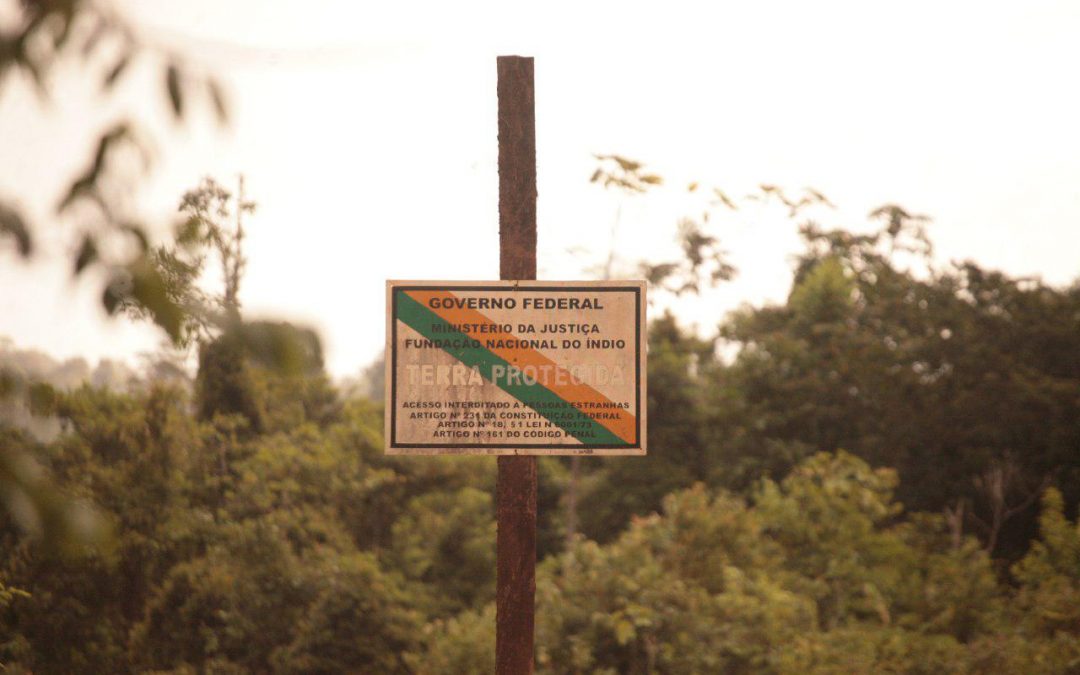
31/Jul/2019
We, the Council of Wajãpi Villages-APINA, want to disclose new information about what is happening in Wajãpi Indigenous Land. And we want to request the support of the federal police or the army again to ensure the safety of Wajãpi Indigenous People.
Yesterday, July 30, 2019, in the morning, we received the Senator Randolfe Rodrigues’ visit. He came to listen to us about what is happening in our Indigenous Land and to seek clarification of some information he had received. The Senator said that he would continue to support us for the police keeping going on investigating the invasion until arresting the invaders. And to remain in Wajãpi Indigenous Land, protecting our communities until we can ensure that the invaders are not in our land anymore. Also, he invited some Wajãpi to go to the Public Federal Ministry to relate what they saw and know about the invaders.
Yesterday, by the end of the afternoon, we received information from the residents of the CTA Village located beside the 210-Highway. About 6 p.m., a young person from that village went to take a bath in the igarapé near the village when he heard someone yelling, “Hey!” behind him. When he turned, he saw a tall and strong man who has big curly hair and beard and was pointing a gun at him. The weapon seemed to be a 12-gauge automatic rifle. Then, the young person became very afraid and went running to the village to call someone to help. Soon later, he came back to the igarapé with five more men. They did not find the invader, but they saw tracks of two people without shoes, each of them walking in different directions. They took photos and made videos of the tracks they saw to show to the police. However, they decided not to follow the tracks because it was growing dark. According to the young person, the man he saw was wearing a black long-sleeved shirt. After receiving that information from the residents of CTA Village, residents of other villages next to the highway organized themselves to watch the section of the highway located inside the Wajãpi Indigenous Land, during the whole night.
Today, in the morning, the residents of CTA found new tracks of two people near the village and let the other Wajãpi communities know. Then, the residents of the villages near the highway organized groups to search for the invaders. They are still searching for them until now.
We, the Wajãpi, want to thank the great support that we are receiving of organizations related to our Indigenous social movement, as APOIANP, COIAB, APIB, AMIM, Hutukara, CIR, FOIRN. As well as the support of the Senator Randolfe Rodrigues, the former Senator João Capiberibe, the federal deputy Joênia Wapixana. Also, the support of partner organizations as Iepé, CIMI, and the support of other civil society organizations as OAB, Associação dos Juízes pela Democracia, Associação Brasileira de Antropologia, Sociedade de Arqueologia Brasileira, Greenpeace, WWF, Rede Eclesiástica Pan Amazônica, and many others. In addition to the UN, the Organization of American States, and people from the whole world.










